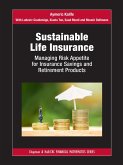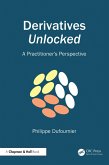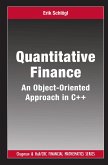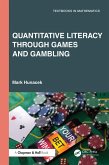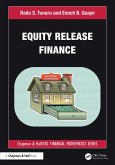Aymeric Kalife, Ludovic Goudenège, Tan Xiaolu, Mouti Saad, Mounir Bellmane
Sustainable Life Insurance (eBook, ePUB)
Managing Risk Appetite for Insurance Savings and Retirement Products
105,95 €
105,95 €
inkl. MwSt.
Sofort per Download lieferbar

53 °P sammeln
105,95 €
Als Download kaufen

105,95 €
inkl. MwSt.
Sofort per Download lieferbar

53 °P sammeln
Jetzt verschenken
Alle Infos zum eBook verschenken
105,95 €
inkl. MwSt.
Sofort per Download lieferbar
Alle Infos zum eBook verschenken

53 °P sammeln
Aymeric Kalife, Ludovic Goudenège, Tan Xiaolu, Mouti Saad, Mounir Bellmane
Sustainable Life Insurance (eBook, ePUB)
Managing Risk Appetite for Insurance Savings and Retirement Products
- Format: ePub
- Merkliste
- Auf die Merkliste
- Bewerten Bewerten
- Teilen
- Produkt teilen
- Produkterinnerung
- Produkterinnerung

Bitte loggen Sie sich zunächst in Ihr Kundenkonto ein oder registrieren Sie sich bei
bücher.de, um das eBook-Abo tolino select nutzen zu können.
Hier können Sie sich einloggen
Hier können Sie sich einloggen
Sie sind bereits eingeloggt. Klicken Sie auf 2. tolino select Abo, um fortzufahren.

Bitte loggen Sie sich zunächst in Ihr Kundenkonto ein oder registrieren Sie sich bei bücher.de, um das eBook-Abo tolino select nutzen zu können.
This book gives an overview of all relevant aspects of traditional and non-traditional savings and retirement products from both insurers' and policyholders' respective risk appetites. Examples of such products include general accounts, whole life, annuities (variable, fixed and fixed indexed, structured), CPPI-based products etc.
- Geräte: eReader
- mit Kopierschutz
- eBook Hilfe
Andere Kunden interessierten sich auch für
![Sustainable Life Insurance (eBook, PDF) Sustainable Life Insurance (eBook, PDF)]() Aymeric KalifeSustainable Life Insurance (eBook, PDF)105,95 €
Aymeric KalifeSustainable Life Insurance (eBook, PDF)105,95 €![Derivatives Unlocked (eBook, ePUB) Derivatives Unlocked (eBook, ePUB)]() Philippe DufournierDerivatives Unlocked (eBook, ePUB)62,95 €
Philippe DufournierDerivatives Unlocked (eBook, ePUB)62,95 €![Your Essential Guide to Quantitative Hedge Fund Investing (eBook, ePUB) Your Essential Guide to Quantitative Hedge Fund Investing (eBook, ePUB)]() Marat MolybogaYour Essential Guide to Quantitative Hedge Fund Investing (eBook, ePUB)51,95 €
Marat MolybogaYour Essential Guide to Quantitative Hedge Fund Investing (eBook, ePUB)51,95 €![Derivatives Unlocked (eBook, PDF) Derivatives Unlocked (eBook, PDF)]() Philippe DufournierDerivatives Unlocked (eBook, PDF)62,95 €
Philippe DufournierDerivatives Unlocked (eBook, PDF)62,95 €![Quantitative Finance (eBook, ePUB) Quantitative Finance (eBook, ePUB)]() Erik SchloglQuantitative Finance (eBook, ePUB)94,95 €
Erik SchloglQuantitative Finance (eBook, ePUB)94,95 €![Quantitative Literacy Through Games and Gambling (eBook, ePUB) Quantitative Literacy Through Games and Gambling (eBook, ePUB)]() Mark HunacekQuantitative Literacy Through Games and Gambling (eBook, ePUB)48,95 €
Mark HunacekQuantitative Literacy Through Games and Gambling (eBook, ePUB)48,95 €![Equity Release Finance (eBook, ePUB) Equity Release Finance (eBook, ePUB)]() Radu S. TunaruEquity Release Finance (eBook, ePUB)147,95 €
Radu S. TunaruEquity Release Finance (eBook, ePUB)147,95 €-
-
-
This book gives an overview of all relevant aspects of traditional and non-traditional savings and retirement products from both insurers' and policyholders' respective risk appetites. Examples of such products include general accounts, whole life, annuities (variable, fixed and fixed indexed, structured), CPPI-based products etc.
Dieser Download kann aus rechtlichen Gründen nur mit Rechnungsadresse in A, B, BG, CY, CZ, D, DK, EW, E, FIN, F, GR, HR, H, IRL, I, LT, L, LR, M, NL, PL, P, R, S, SLO, SK ausgeliefert werden.
Produktdetails
- Produktdetails
- Verlag: Taylor & Francis eBooks
- Seitenzahl: 540
- Erscheinungstermin: 18. August 2023
- Englisch
- ISBN-13: 9781000876291
- Artikelnr.: 68342150
- Verlag: Taylor & Francis eBooks
- Seitenzahl: 540
- Erscheinungstermin: 18. August 2023
- Englisch
- ISBN-13: 9781000876291
- Artikelnr.: 68342150
- Herstellerkennzeichnung Die Herstellerinformationen sind derzeit nicht verfügbar.
Aymeric Kalife has been the CEO of iDigital Partners since 2019, specializing in insurance and investment advisory while leveraging on digital technologies, and Adjunct Professor in Finance at Paris Dauphine-PSL University. He was Global Head of Savings (Risk Management, Savings Strategy) and Deputy Group Life Chief Actuary at AXA for 11 years, notably supervising the hedging platform of variable annuities ($130 billion assets under management: AuM) and contributing to reshaping the savings business across 20 entities through capital-light structuring innovations. Prior to AXA he worked for eight years in investment banking, as VP volatility strategist at Deutsche Bank, hybrids derivatives structurer at Merrill Lynch, and quant in commodities at EDF and in interest rates at ABN AMRO. His research interests are in market impact and liquidity risk for flow/structured products, fixed and variable annuities, insurance policyholders' behaviour and associated optimal product design, and environmental, social and governance (ESG) asset selection and optimal allocation, developed in a dozen academic publications and awards from the US Society of Actuaries. He holds science (statistics, probability), finance, economics and law master's degrees from Pierre and Marie Curie University/École Polytechnique, ENSAE, Sorbonne and Science Po, an MBA at HEC Paris, and a Ph.D at Paris Dauphine University and ESSEC business school.
Ludovic Goudenège has been a researcher in the French national research institute, CNRS (first class), since 2010 and a professor at École CentraleSupélec, and was a consultant in insurance at AXA Group Risk Management. He is a specialist in stochastic partial differential equations, particularly in the presence of strong or singular nonlinearities, for which he develops theoretical results on the convergence and numerical analysis of numerical schemes. He also works with the Inria MathRisk team for the development of numerical methods for finance and insurance. It develops statistical learning methods (machine learning) for solving partial differential equations (PDEs) in large dimensions, nonlinear, dynamic programming, optimal downtime, etc. He holds a PhD in applied mathematics at ENS Cachan (stochastic partial differential equations, numerical simulations, finite elements methods), a master's in probability at University of Pierre and Marie Curie, a master's in mathematical analysis at Université de Rennes, and a fifth national rank at the Aggregation of Mathematics. He is now a member of the mathematical federation of the École CentraleSupélec. His research interests are in the theory of stochastic and deterministic partial differential equations, the associated numerical methods and their application in finance and insurance.
Xiaolu Tan has been Associate Professor at the Chinese University of Hong Kong since 2019. He is a member of the editorial board of the journals Numerical Algebra, Control and Optimization, Stochastic Processes and Their Applications and Journal of Optimization Theory and Applications. Previously he was Assistant Professor at Paris-Dauphine University from 2013 to 2019. He was a consultant in insurance at AXA Group Risk Management between 2011 and 2017. He holds a master's and a PhD in applied probability at École Polytechnique. His research interests, transalated into more than 30 academic publications, are in stochastic analysis, stochastic optimal control, the numerical simulation of stochastic differential equations (SDEs), the numerical method for nonlinear PDEs, the numerical method for optimal control problems and their application in finance and insurance.
Saad Mouti is an Assistant Professor at UCSB PSTAT Department, after a postdoctoral fellowship at the Consortium of Data Analytics in Risk, part of the Economics and Statistics Department at the University of California - Berkeley. He completed his PhD in financial and actuarial mathematics at Pierre and Marie Curie University (Paris 6, France) in 2017. Prior to that he obtained a financial engineering diploma from the National School of Applied Mathematics and Computer Science of Grenoble in 2010 and an MSc in the statistical processing of information from Paris-Dauphine University in 2011. Saad's thesis was financed by AXA to address different financial risks for the life insurance industry and englobed the pricing and hedging of life insurance products and policyholders' rational behaviour, rough volatility modelling and optimal strategies for buying a book of options under market impact constraints. His research interests are theoretical, applied and engineering approaches to applying data science to risk measurement and management problems. His current subjects are environmental, social and governance investing, asset-pricing theory, volatility modelling and causal inference applications for health science.
Mounir Bellmane has been a Consultant Manager at Towers Watson since 2020, providing advice on asset and liability modelling (ALM), merger and acquisition (M&A) activity, the optimization of ALM models and model point reduction techniques for stochastic models. Previously he was a life and savings specialist at AXA between 2014 and 2020, during which time he managed projects in the following areas: the implementation and monitoring of profitability models, the optimization of run-time calculation, the implementation of Solvency II ALM metrics, capital risk management, product design, the monitoring and calibration of life risks and the design and implementation of dynamic customer behaviour functions. He holds a master's in actuarial sciences from ISFA, a master's in applied mathematics from Paris-Dauphine University and an MBA from ESCP Business School.
Ludovic Goudenège has been a researcher in the French national research institute, CNRS (first class), since 2010 and a professor at École CentraleSupélec, and was a consultant in insurance at AXA Group Risk Management. He is a specialist in stochastic partial differential equations, particularly in the presence of strong or singular nonlinearities, for which he develops theoretical results on the convergence and numerical analysis of numerical schemes. He also works with the Inria MathRisk team for the development of numerical methods for finance and insurance. It develops statistical learning methods (machine learning) for solving partial differential equations (PDEs) in large dimensions, nonlinear, dynamic programming, optimal downtime, etc. He holds a PhD in applied mathematics at ENS Cachan (stochastic partial differential equations, numerical simulations, finite elements methods), a master's in probability at University of Pierre and Marie Curie, a master's in mathematical analysis at Université de Rennes, and a fifth national rank at the Aggregation of Mathematics. He is now a member of the mathematical federation of the École CentraleSupélec. His research interests are in the theory of stochastic and deterministic partial differential equations, the associated numerical methods and their application in finance and insurance.
Xiaolu Tan has been Associate Professor at the Chinese University of Hong Kong since 2019. He is a member of the editorial board of the journals Numerical Algebra, Control and Optimization, Stochastic Processes and Their Applications and Journal of Optimization Theory and Applications. Previously he was Assistant Professor at Paris-Dauphine University from 2013 to 2019. He was a consultant in insurance at AXA Group Risk Management between 2011 and 2017. He holds a master's and a PhD in applied probability at École Polytechnique. His research interests, transalated into more than 30 academic publications, are in stochastic analysis, stochastic optimal control, the numerical simulation of stochastic differential equations (SDEs), the numerical method for nonlinear PDEs, the numerical method for optimal control problems and their application in finance and insurance.
Saad Mouti is an Assistant Professor at UCSB PSTAT Department, after a postdoctoral fellowship at the Consortium of Data Analytics in Risk, part of the Economics and Statistics Department at the University of California - Berkeley. He completed his PhD in financial and actuarial mathematics at Pierre and Marie Curie University (Paris 6, France) in 2017. Prior to that he obtained a financial engineering diploma from the National School of Applied Mathematics and Computer Science of Grenoble in 2010 and an MSc in the statistical processing of information from Paris-Dauphine University in 2011. Saad's thesis was financed by AXA to address different financial risks for the life insurance industry and englobed the pricing and hedging of life insurance products and policyholders' rational behaviour, rough volatility modelling and optimal strategies for buying a book of options under market impact constraints. His research interests are theoretical, applied and engineering approaches to applying data science to risk measurement and management problems. His current subjects are environmental, social and governance investing, asset-pricing theory, volatility modelling and causal inference applications for health science.
Mounir Bellmane has been a Consultant Manager at Towers Watson since 2020, providing advice on asset and liability modelling (ALM), merger and acquisition (M&A) activity, the optimization of ALM models and model point reduction techniques for stochastic models. Previously he was a life and savings specialist at AXA between 2014 and 2020, during which time he managed projects in the following areas: the implementation and monitoring of profitability models, the optimization of run-time calculation, the implementation of Solvency II ALM metrics, capital risk management, product design, the monitoring and calibration of life risks and the design and implementation of dynamic customer behaviour functions. He holds a master's in actuarial sciences from ISFA, a master's in applied mathematics from Paris-Dauphine University and an MBA from ESCP Business School.
Introduction. 1. The transformation of the Risk Appetite for Sustainable
Savings and Retirement. 1.1. The transformation of the insurance business
since the past decade. 1.2. Securing long-term sustainable business growth:
from Governance to effective risk management. 2. Products Risk Appetite for
Sustainable Savings and Retirement. 2.1. The increasingly selective
customer' Risk Appetite across the four axes: yields/flexibility/financial
guarantees/cost. 2.2. Meeting both shareholders and policyholders Appetites
through sustainable Capital-light products? 3. Measuring Risk Appetite for
Sustainable Savings and Retirement. 3.1. Considerations on Risk-neutral vs.
Real-world pricing framework. 3.2. Hybrid Financial Risks Modelling for
Sustainable Savings and Retirement. 3.3. Computational challenges and
opportunities: accelerating the computational Run Time by Speeding up the
convergence of Monte Carlo simulations. 4. Designing Products aligned with
Risk Appetite for Sustainable Savings and Retirement. 4.1. Screening
sustainable opportunities balancing shareholders vs. customers' interests
within persistent low rates and growing regulatory constraints. 4.2
Sustainable Liabilities designs enhancements. 4.3 Sustainable Investment
Assets designs. 5. Hedging Risks aligned with Risk Appetite for Sustainable
Savings and Retirement. 5.1. Hedging principles, processes and PandL
attribution. 5.2. From Dynamic hedging to Semi-static hedging. 5.3.
Managing hedging liquidity constraints. Bibliography.
Savings and Retirement. 1.1. The transformation of the insurance business
since the past decade. 1.2. Securing long-term sustainable business growth:
from Governance to effective risk management. 2. Products Risk Appetite for
Sustainable Savings and Retirement. 2.1. The increasingly selective
customer' Risk Appetite across the four axes: yields/flexibility/financial
guarantees/cost. 2.2. Meeting both shareholders and policyholders Appetites
through sustainable Capital-light products? 3. Measuring Risk Appetite for
Sustainable Savings and Retirement. 3.1. Considerations on Risk-neutral vs.
Real-world pricing framework. 3.2. Hybrid Financial Risks Modelling for
Sustainable Savings and Retirement. 3.3. Computational challenges and
opportunities: accelerating the computational Run Time by Speeding up the
convergence of Monte Carlo simulations. 4. Designing Products aligned with
Risk Appetite for Sustainable Savings and Retirement. 4.1. Screening
sustainable opportunities balancing shareholders vs. customers' interests
within persistent low rates and growing regulatory constraints. 4.2
Sustainable Liabilities designs enhancements. 4.3 Sustainable Investment
Assets designs. 5. Hedging Risks aligned with Risk Appetite for Sustainable
Savings and Retirement. 5.1. Hedging principles, processes and PandL
attribution. 5.2. From Dynamic hedging to Semi-static hedging. 5.3.
Managing hedging liquidity constraints. Bibliography.
Introduction. 1. The transformation of the Risk Appetite for Sustainable
Savings and Retirement. 1.1. The transformation of the insurance business
since the past decade. 1.2. Securing long-term sustainable business growth:
from Governance to effective risk management. 2. Products Risk Appetite for
Sustainable Savings and Retirement. 2.1. The increasingly selective
customer' Risk Appetite across the four axes: yields/flexibility/financial
guarantees/cost. 2.2. Meeting both shareholders and policyholders Appetites
through sustainable Capital-light products? 3. Measuring Risk Appetite for
Sustainable Savings and Retirement. 3.1. Considerations on Risk-neutral vs.
Real-world pricing framework. 3.2. Hybrid Financial Risks Modelling for
Sustainable Savings and Retirement. 3.3. Computational challenges and
opportunities: accelerating the computational Run Time by Speeding up the
convergence of Monte Carlo simulations. 4. Designing Products aligned with
Risk Appetite for Sustainable Savings and Retirement. 4.1. Screening
sustainable opportunities balancing shareholders vs. customers' interests
within persistent low rates and growing regulatory constraints. 4.2
Sustainable Liabilities designs enhancements. 4.3 Sustainable Investment
Assets designs. 5. Hedging Risks aligned with Risk Appetite for Sustainable
Savings and Retirement. 5.1. Hedging principles, processes and PandL
attribution. 5.2. From Dynamic hedging to Semi-static hedging. 5.3.
Managing hedging liquidity constraints. Bibliography.
Savings and Retirement. 1.1. The transformation of the insurance business
since the past decade. 1.2. Securing long-term sustainable business growth:
from Governance to effective risk management. 2. Products Risk Appetite for
Sustainable Savings and Retirement. 2.1. The increasingly selective
customer' Risk Appetite across the four axes: yields/flexibility/financial
guarantees/cost. 2.2. Meeting both shareholders and policyholders Appetites
through sustainable Capital-light products? 3. Measuring Risk Appetite for
Sustainable Savings and Retirement. 3.1. Considerations on Risk-neutral vs.
Real-world pricing framework. 3.2. Hybrid Financial Risks Modelling for
Sustainable Savings and Retirement. 3.3. Computational challenges and
opportunities: accelerating the computational Run Time by Speeding up the
convergence of Monte Carlo simulations. 4. Designing Products aligned with
Risk Appetite for Sustainable Savings and Retirement. 4.1. Screening
sustainable opportunities balancing shareholders vs. customers' interests
within persistent low rates and growing regulatory constraints. 4.2
Sustainable Liabilities designs enhancements. 4.3 Sustainable Investment
Assets designs. 5. Hedging Risks aligned with Risk Appetite for Sustainable
Savings and Retirement. 5.1. Hedging principles, processes and PandL
attribution. 5.2. From Dynamic hedging to Semi-static hedging. 5.3.
Managing hedging liquidity constraints. Bibliography.

